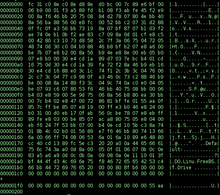
Back تنفيذي Arabic Изпълним файл Bulgarian Izvršni kod BS Executable Catalan Spustitelný soubor Czech Ausführbare Datei German Εκτελέσιμο αρχείο Greek Plenumebla dosiero Esperanto Ejecutable Spanish اجراپذیر Persian
| Program execution |
|---|
| General concepts |
| Types of code |
| Compilation strategies |
| Notable runtimes |
|
| Notable compilers & toolchains |
|

In computer science, executable code, an executable file, or an executable program, sometimes simply referred to as an executable or binary, causes a computer "to perform indicated tasks according to encoded instructions",[2] as opposed to a data file that must be interpreted (parsed) by an interpreter to be functional.[3]
The exact interpretation depends upon the use. "Instructions" is traditionally taken to mean machine code instructions for a physical CPU.[4] In some contexts, a file containing scripting instructions (such as bytecode) may also be considered executable.
- ^ Cite error: The named reference
Celovi_2022was invoked but never defined (see the help page). - ^ Cite error: The named reference
MW_2008was invoked but never defined (see the help page). - ^ Cite error: The named reference
Mueller_2007was invoked but never defined (see the help page). - ^ Cite error: The named reference
GFG_2015was invoked but never defined (see the help page).